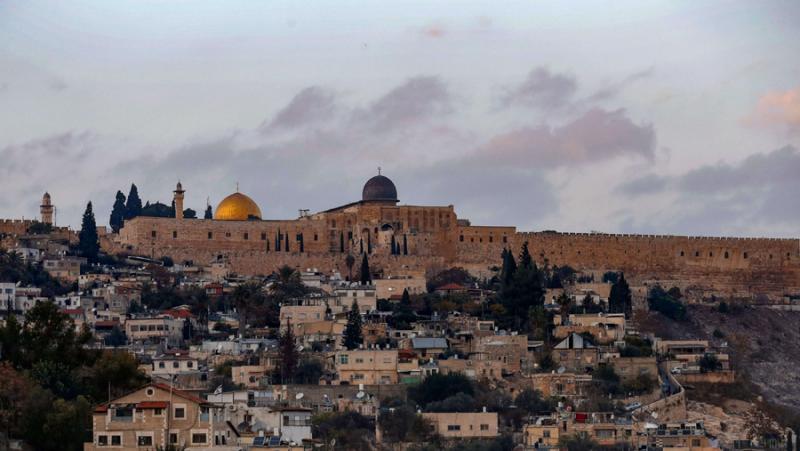United States is absent from discussion of the Palestinian-Israeli conflict

The Palestinian neighbourhood of Silwan is seen, with the Dome of the Rock in the Al-Aqsa mosque compound in the background, in Israeli-occupied East Jerusalem, December 10. (AFP)
The US foothold in the region is clearly in decline but it is on the Palestinian-Israeli conflict that its shrunken influence is most apparent.
Walk around Jerusalem and the presence of the region’s last indigenous imperial power is unmistakable. There is the 16th-century wall, of course, built by Ottoman Sultan Suleiman around the old city. There is First Station, a converted railway station that is one of many structures from the 400 years of Palestine’s Ottoman era.
These traces of Ottoman rule have a particular poignancy as 2020 begins. The pendulum of power is swinging wildly and the Western dominance of the Middle East over the past century may be ending.
Consider the following: On the last day of 2019, the US Embassy in Baghdad was besieged by supporters of pro-Iran Iraqi militia groups. The Trump administration responded with bullish rhetoric — and the deployment of an additional 750 troops to the region — but there was an unmistakable sense of the United States losing control of both the regional narrative and the plot.
On January 2, Turkey’s parliament debated a bill that sought permission to deploy troops in Libya, where it is allied with the country’s UN-backed government. On December 27, Russia, Iran and China had their first joint naval exercises in the Gulf of Oman, a stretch of ocean traditionally dominated by the US Navy’s 5th Fleet.
The US foothold in the region is clearly in decline but it is on the Palestinian-Israeli conflict that its shrunken influence is most apparent. Speak to Israelis — both Jews and Arabs — or to Palestinians in East Jerusalem and the West Bank and the talk is of indigenous, rather than foreign-led, peace initiatives.
The United States is absent from the discussion — its invisibility as striking as its former prominence as a supposed honest broker. The worldview of US President Donald Trump’s administration features only in the oblique but wholesale rejection of it.
In Bethlehem, Sheik Rafaat, a cleric from Nablus, insisted to a mixed community of Palestinian Muslims and Christians that “we have different faiths but we have to be one unit.” In Nazareth, the Reverend Hanna Kildani, a Jordanian priest who serves as the Latin patriarchal vicar for Israel, declared: “We need to stop building walls between people and build bridges instead.”
It was a resounding critique both of Trump’s advocacy of a wall between the United States and Mexico as well as the separation barrier that Israel started to build in 2002 to seal off East Jerusalem from the West Bank.
In Jerusalem, Orthodox Rabbi Shlomo Dov Rosen said a wall cannot be a permanent solution and human engagement is the only way forward. “It’s not impossible that the most meaningful story of our life is about how we fit into the lives of others,” he said.
In Galilee, Reform Rabbi Or Zohar said, there are remarkable examples of engagement between Jews and Arabs. Hararit village, where Zohar has worked for seven years, is part of the Misgav Regional Council, which has 29 Jewish and six Arab villages, a Jewish mayor and an Arab deputy mayor.
“There is an understanding that we need to develop together, that we have shared economic and environmental concerns,” Zohar told me, “there are grass-roots initiatives that enable Jewish and Arab families to meet monthly. Many collaborations are happening on the local level.”
Another example of grass-roots efforts to build bridges of trust and understanding is Musalaha, a non-profit organisation in Jerusalem that runs programmes to promote reconciliation between Muslims, Jews and Christians. Malkon Marizian, a Palestinian Christian from East Jerusalem, volunteers with Musalaha but it is his day job — as a guide on what Marizian calls “a geopolitical tour” of the old city — that illustrates the desperate intensity of efforts to prevent historical narratives from subsuming the present and the future.
Marizian works alongside an Israeli Jewish guide, with each giving tourists their own perspective on places and events. The idea is to provide space for alternative views, he said, and the hope is to foster some understanding of both sides.
This is uplifting in all sorts of ways but not for Palestinians such as Hamoud Abul Hawa. In his mid-50s, Abul Hawa has lived in East Jerusalem all his life and witnessed Israeli control tighten to a stranglehold.
He said he has no hope that his statelessness and that of his people will be resolved by Palestinian leaders and Arab countries. “Mahmoud Abbas is bad,” he said of the president of the Palestinian Authority, “as are they all — Saeb Erekat, Hanan Ashrawi, (Saudi Crown Prince Mohammed bin Salman bin Abdulaziz). The wars over water will be fought and the apocalypse is coming. That will be our moment.”
Originally published in The Arab Weekly

